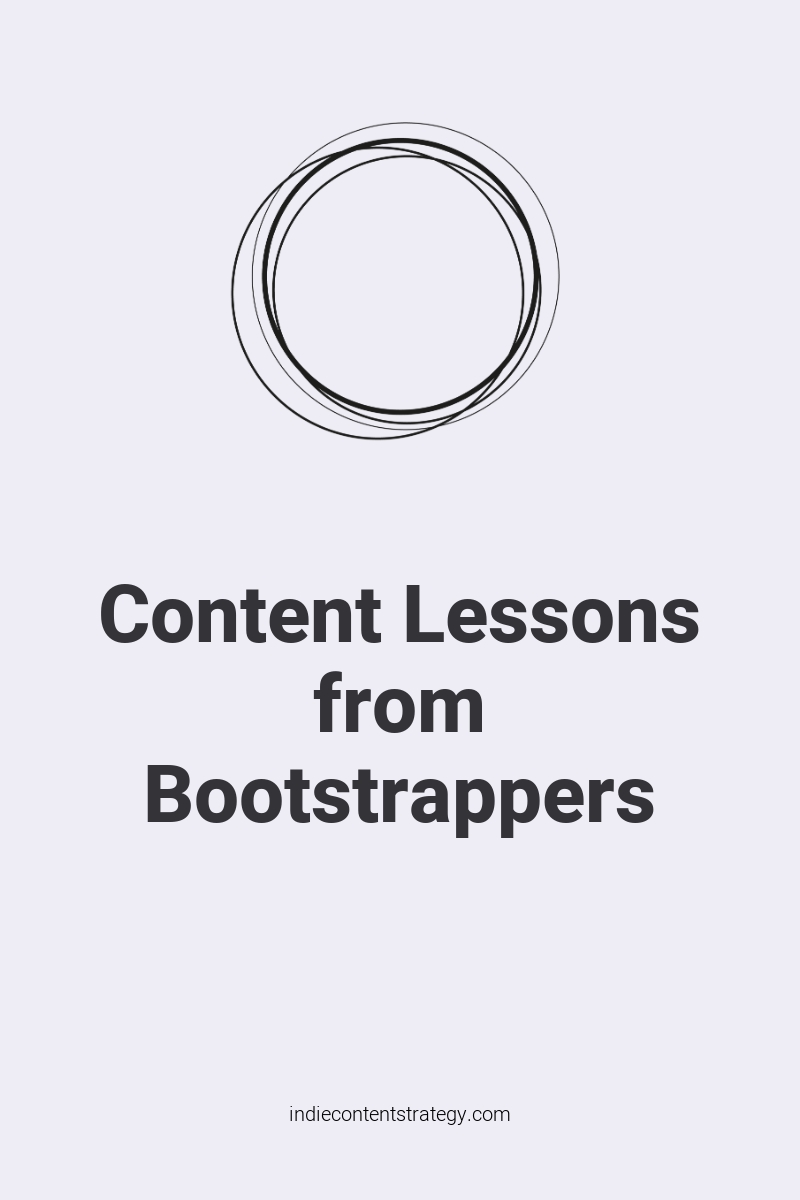We’re all just figuring out how to best use content for our businesses as we go. I interviewed some founders to ask them about their lessons learned so far.
Why founders are unknown content strategy pros
Indie founders often naturally develop a good understanding of content strategy along their way to success (or failure, which hopefully leads to success later). They do so not necessarily because they took a deep dive into the theory of it, but because they have no choice.
Bootstrappers have to work with content if they want their business to grow. How else are people going to find out about what they are building? Especially solo founders and small teams can feel the impact of content on their businesses in a very raw way.
I wrote about how similar I experience their skill set to be before. But what lessons do founders end up learning during their content journey? I talked to some of them during interviews for my master’s thesis about content strategy for bootstrappers. Anne-Laure Le Cunff, Pat Walls, Corey Gwin, Mo Rajabifard & Armin Ulrich shared their hard-won insights with me, and I distilled some of them for you!

Content is more than just marketing
When I say content, you automatically think content marketing, am I right? As in: Using content as a way to reach more potential users, to convince them to buy, to get more revenue. But content is not only about that. There are more benefits to it than “just” more leads and revenue:
- Creating content helps you think more clearly about your product. Composing content for your landing page, blog, newsletter,… helps you reframe your own thinking, and to articulate your perspective. I’m once again linking to Steph’s great article Writing is Thinking that elaborates on that thought! (Here’s an article I wrote about my messy process of writing, if you want to see how this thinking is happening behind the scenes!)
- It helps you learn about the problem space & potential users. This happens through your own research while writing, as well as through conversations and feedback that evolve from your content.
- Publishing content helps you sharpen your positioning. Feedback on your content can also be increased traffic via search, time spent on your page and other signals. They can help you see whether what you wrote about is valuable and relatable for others. Do they even think about the problem you’re solving in the same way as you?
“It’s not just about blog posts. It’s about creating something that captivates people: That gets their attention, helps them trust you and get what you’re saying. That way, your business can bring about the change you want to see in the world.”
Corey Gwin
The content strategist in me urges to emphasize that product copy, e-mails or API documentations are all “content” as well. So there are a lot more goals to be pursued by content than just getting more eyeballs.

The journey towards useful content is full of experiments
All of the founders talked about their journey starting with just doing something, based on a hypothesis – a guess of what content could be useful. They began creating imperfect content and put it out there. Their processes weren’t optimized, they had no experience in doing specific content formats, they didn’t know if anyone would read it.
“At first, it was really experimental, but after a while you start seeing trends. Based on the feedback you get you can start to adapt your content strategy and decide what pieces of content to invest in.”
Anne-Laure Le Cunff
When they started seeing patterns, they kept doing more of the same – all while learning about SEO, design and how to measure success on the go.

You need to be brave to create content
You seriously need some guts to put your view on things out there for others to judge. Almost all of the founders I interviewed said that this is emotionally hard for them. All of the work that goes into creating content is a bit intimidating whenever you’re not doing it, and it feels like exposing yourself.
“It becomes personal. You’re like… I don’t want to screw up. I don’t want to disappoint people.”
Corey Gwin
But they also said they struggle less, the more often they are brave enough to do it anyway.

Consistency is a secret (and uncomfortable) weapon
So, consistency in publishing content does help make it less scary. It takes away the weight from one single piece of content. Not everything will be a masterpiece, but in the grand scheme that doesn’t matter much. It still helps to build up your audience’s reading habit, to strengthen your profile and to stay in people’s minds.
Consistency also helps to consistently get better (duh!): You’ll get better at writing, at designing graphics, at sending your newsletter out at the right time, at structuring your content, at producing it effectively,.. These changes for the better don’t happen overnight, but gradually. I think it’s important to think about the power of tiny gains over time: By getting 1% better each day, you’ll end up thirty-seven times better after one year.
We as humans don’t really like to hear that consistency is needed. It’s hard to really commit to doing content consistently, just as it is hard to eat healthy consistently, or work out consistently. We need to build good content habits first.
“You’re just going to do this every week. And one year later, you’ll thank yourself.”
Mo Rajabifard

Content is never figured out
During my interviews, even founders with a huge track record of successful content mused about how they still didn’t figure out a formula for nailing it every time. Sadly, there is no success formula and no get rich quick scheme for content.
Reaching the right people at the right time with the right message is a moving target. Even if you optimize your strategy and skills, there are no guarantees.
“I’m constantly surprised about what does well and what doesn’t. I see a blog post that I think is going to crush it and then it flops. Or the other way around – something does really well that I didn’t expect to.”
Pat Walls
We’re learning as we go – do we still need strategy?
Building things and hiding behind them is easy. It’s hard for most makers to talk about their products and to effectively use content to explain, market, build trust. It seems daunting at first, and it’s impossible to know all the answers unless you start doing it.
That’s not to say that you should just scrap strategizing completely! All of the founders I interviewed were really good at observing which of their hypotheses were actually working out and which didn’t. They had goals and plans. They didn’t just randomly try out things – they committed to finding out which were the right things.
As a content strategist, I can tell you a lot about how to analyze things and make plans. Working on my master’s thesis, I want to figure out how to best do that within the uncertainty and constraints of starting a bootstrapped business. I’d be happy if you joined me along the way!
Subscribe to my newsletter to get glimpses into my research, as well as resources & articles that help you grow your business with content 👇️



